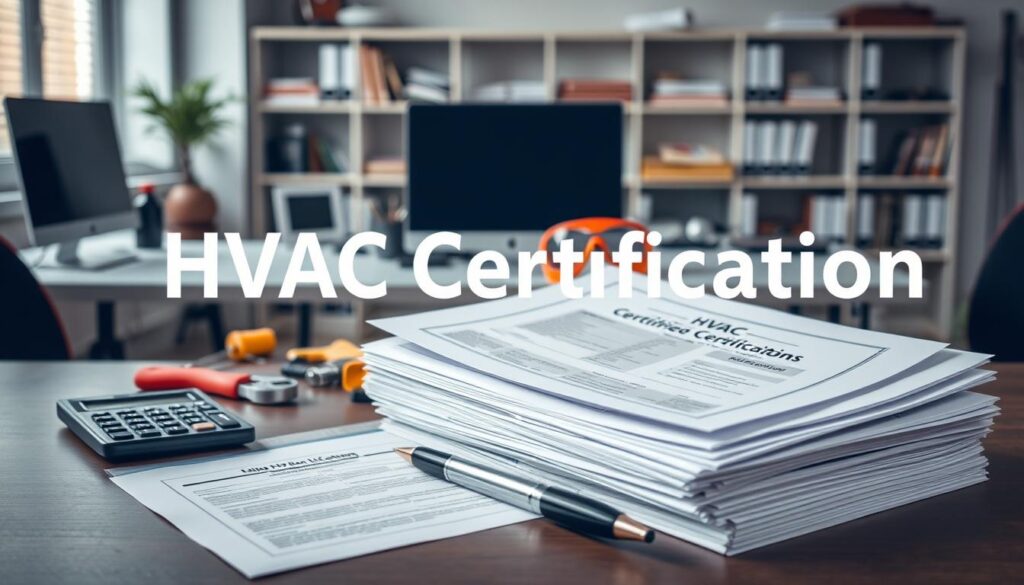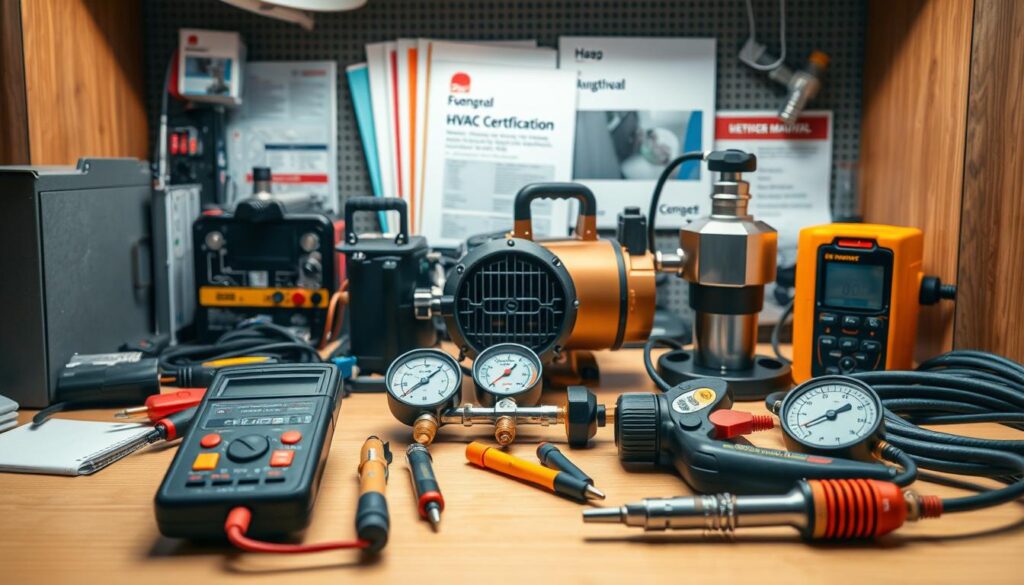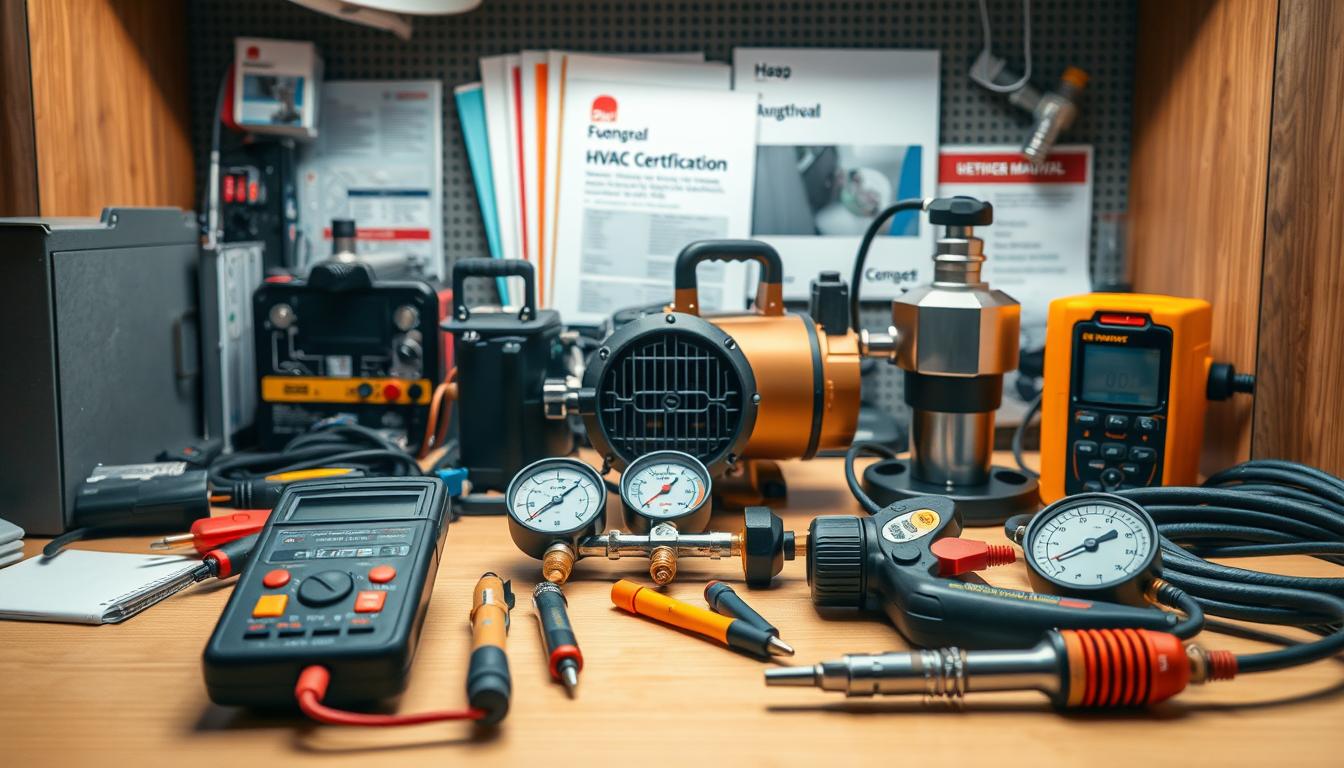Knowing the cost of HVAC certification is key for those starting a career in heating, ventilation, and air conditioning. The cost can change based on the certification type and the training school. This guide will break down the costs of getting HVAC certified, helping you decide on your career path.

Introduction to HVAC Certification
For those entering the HVAC field, understanding certification costs is vital. Knowing these costs helps plan education and training, setting up for success in future careers. The cost includes initial training and certification fees, plus ongoing expenses like renewal fees and continuing education.
Key Takeaways
- Understanding the hvac certification cost is essential for career planning
- The cost of hvac certification varies depending on the type of certification and institution
- Initial training and certification fees are just the beginning of the costs involved
- Ongoing expenses, such as renewal fees, are also a consideration
- Continuing education requirements are necessary to maintain certification
- Planning ahead can help individuals make the most of their investment in hvac certification
Understanding HVAC Certification Basics
Getting into the HVAC field means you need the right certifications. HVAC certification requirements change by state, but most jobs need some certification. There are many types of HVAC certifications out there, each with its own rules and perks.
First, you should know about the types of HVAC certifications. You can get certified in installation, repair, and maintenance. There are also special certifications for refrigeration and air quality. Picking the right one shows your skills and opens more job doors.
It’s also key to know the HVAC certification requirements in your state. Some places need a license to work in HVAC. Others have specific rules for getting certified. Knowing these helps you meet state standards and be a qualified technician.
Having the right HVAC certification is vital for your career. By picking the right one and meeting the HVAC certification requirements, you show your skills. This boosts your job chances and helps you thrive in this growing field.
How Much Does It Cost to Get HVAC Certification: Full Breakdown
Thinking about a career in heating, ventilation, and air conditioning (HVAC)? It’s key to know the costs of hvac certification programs. The cost of hvac certification programs changes based on the program type, location, and school.
The prices for hvac certification programs vary a lot. Here’s what you might expect to pay:
- Trade school programs: $1,000 – $3,000
- Community college programs: $2,000 – $5,000
- Online training programs: $500 – $2,000
It’s important to look around and compare hvac certification programs costs. This way, you can find one that matches your budget and career dreams. Some programs also offer financial help or scholarships to reduce the cost.
In summary, getting hvac certification programs is a big investment. But, it can open doors to a fulfilling and well-paying job in HVAC. By understanding the costs and looking at different programs, you can make a smart choice. This will help you start a successful HVAC career.
Initial Education and Training Program Costs
Thinking about a career in HVAC? You need to know about the costs of education and training first. The hvac certification cost changes based on the program and school you pick. You’ll start with a basic education, which might be at a trade school, community college, or online.
Program prices vary a lot. They can be a few thousand dollars or more than $15,000. This depends on where you are, how long it lasts, and what it covers. It’s smart to look at different programs’ costs to find one that matches your budget and goals. Some might offer financial help or scholarships to lower the initial education costs.
- Program length and style
- Tuition and other costs
- Financial aid and scholarships
- Job placement rates and future job chances
By thinking about these points and comparing costs and benefits, you can choose the right HVAC education and training.
Certification Exam Fees and Testing Expenses
When you’re getting ready for hvac certification exams, think about the costs. Certification exam fees change based on the certification and testing group. Usually, you’ll pay between $100 to $300 for one exam.
Here are some things that can change the certification exam fees:
- Type of certification: Fees differ for certifications like EPA 608 or North American Technician Excellence (NATE).
- Testing organization: Costs vary by testing group, like the Air-Conditioning, Heating, Refrigeration Certification Board (ACHR) or the International Association of Certified Home Inspectors (InterNACHI).
- Exam format: Fees can change based on the exam type, like written, practical, or online.
It’s key to look into the hvac certification exams you want and their certification exam fees. This helps you plan your budget. Knowing these costs helps you make smart choices for your certification path.

Don’t forget about other costs like study materials, practice exams, and travel. When you add these up, you can make a full budget. This way, you can reach your certification goals.
Additional Required Certifications and Licenses
When you’re looking into a career in HVAC, it’s key to think about the hvac certification licenses and additional certifications you’ll need. These show your skills and make sure you follow the rules of the industry.
In the U.S., HVAC techs need special licenses and certifications for working with refrigerants and electrical systems. The Environmental Protection Agency (EPA) requires EPA Section 608 certification for handling refrigerants. This is a big part of HVAC work.
Each state has its own rules for HVAC techs. Some need a state license, while others might just need to register or get certified. The state-specific license fees can change, so it’s important to check what your state requires.
Getting specialty certifications, like those from the North American Technician Excellence (NATE), can also help. These show you’re good at specific things, like air conditioning or gas heating. They can make you more likely to get hired and earn more.
- EPA Section 608 certification
- State-specific license fees
- Specialty certification expenses
Getting these additional certifications and licenses might seem tough, but it’s a big step up in your HVAC career. By getting hvac certification licenses and other certifications, you can make more money, find better jobs, and show you’re serious about your work.
Tools and Equipment Investment
Getting hvac certification means you’ll need to spend money on tools and equipment. The cost of hvac certification equipment depends on what you need. Things like the type, brand, and quality of the equipment matter a lot.
Students in hvac certification programs often have to buy basic tools. These include multimeters, thermometers, and pressure gauges. Prices can vary from a few hundred to several thousand dollars. You might also need to buy special hvac certification equipment, like refrigerant recovery units. This can increase the total cost.

- Hand tools, such as wrenches and pliers
- Power tools, such as drills and saws
- Testing equipment, such as multimeters and thermometers
- Specialized hvac certification equipment, such as refrigerant recovery units
It’s smart to look around and compare prices. Many makers offer deals for students. These can help lower the cost of tools and equipment. By getting the right hvac certification equipment and tools, you’ll be ready for a great career in hvac.
Ongoing Certification Maintenance Costs
Getting hvac certification is just the start. You also need to think about the costs to keep it. These include renewal fees, continuing education, and membership in professional groups. Knowing these ongoing costs helps you plan for your HVAC career.
The hvac certification maintenance process has renewal fees that change based on the certifier and your level. You also need to take continuing education courses. These keep you current with industry trends and tech.
- Rennual fees: These fees can range from $50 to $200, depending on the certifying organization.
- Continuing education courses: These courses can cost between $100 to $500, depending on the provider and the course content.
- Professional association memberships: These memberships can cost between $50 to $200 per year, depending on the organization and the level of membership.
Understanding the ongoing costs of hvac certification maintenance helps you make smart career choices. It’s key to research the costs and needs of each certifying body. Plan ahead for these expenses to ensure a successful HVAC career.
Financial Aid and Payment Options
Getting an HVAC certification can cost a lot, but there are ways to make it cheaper. Many groups offer hvac certification financial aid to those starting a career in HVAC. This aid can lessen the cost of getting certified, making it easier for people to join this field.
There are several payment options for HVAC certification. You can get scholarships, employer help, or set up a payment plan. These choices can help cover the costs of getting certified, like tuition and study materials. By looking into these options, you can find a payment plan that works for you.
Here are some examples of financial aid and payment options available for HVAC certification:
- Scholarships: Many groups give out scholarships for HVAC certification. These can help pay for tuition, exam fees, and study materials.
- Employer Reimbursement Programs: Some companies help their employees pay for HVAC certification costs.
- Payment Plans: Many programs and providers offer payment plans to help with certification costs.
By checking out these financial aid and payment options, you can find a way to pay for your HVAC certification. It’s also important to know that some organizations offer hvac certification financial aid to those starting a career in HVAC.
Return on Investment and Career Outlook
Thinking about hvac certification means looking at the return on investment and career outlook. The need for skilled HVAC technicians is growing. This is because of the demand for climate control and energy-efficient systems. So, those with hvac certification can look forward to a bright career outlook, with chances for growth and good pay.
The salary range for HVAC technicians is a key factor in return on investment. Reports show that certified technicians can make between $40,000 and $70,000 a year. This is a good return on the investment in hvac certification. Benefits of hvac certification include:
- More job opportunities and chances for career growth
- Higher salaries and better earning potential
- More confidence and knowledge in HVAC systems and technologies
The hvac certification career outlook is bright, with a strong need for skilled technicians. The return on investment can be more than the initial cost of certification. By getting hvac certification, you set yourself up for success in a rewarding field.
Conclusion: Making Your HVAC Certification Investment Count
The cost of getting an HVAC certification is high, but the benefits are worth it. Getting certified not only meets legal standards but also opens doors to a fulfilling career. You’ll be ready for a successful future in the HVAC field.
Your HVAC certification investment is a step towards a better tomorrow. With proper training and ongoing learning, you’ll find many career paths open to you. Start now and look into the different HVAC certification choices out there.
FAQ
What types of HVAC certifications are available?
You can get several HVAC certifications. These include EPA Section 608, NATE (North American Technician Excellence), and state-specific licenses. The type of certification needed depends on where you are and the HVAC work you do.
Why is HVAC certification important?
HVAC certification shows you know your stuff. It’s also often required by law in many places. It makes you stand out and can boost your pay.
What are the legal requirements for HVAC certification by state?
HVAC certification laws differ by state. Some need specific licenses, like EPA Section 608. Others are more relaxed. Always check your state’s laws to meet requirements.
How much does it cost to get HVAC certification?
HVAC certification costs vary. It depends on the certification, training, and any extra fees. Tuition, exam fees, and tool costs add up.
What are the costs associated with HVAC certification maintenance?
Getting certified is just the start. Maintenance costs include renewal fees, continuing education, and association memberships. Plan for these ongoing expenses.
What financial aid and payment options are available for HVAC certification?
There are ways to help pay for HVAC certification. Look into scholarships, employer help, and payment plans. These can make getting certified more doable.
What is the return on investment for HVAC certification?
HVAC certification can pay off big time. It can lead to better pay, job security, and career growth. But, the exact benefits depend on your location, work type, and career goals.
